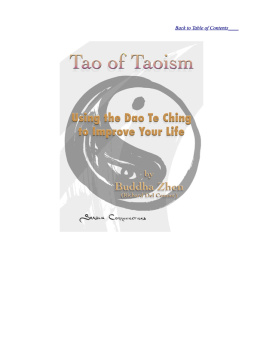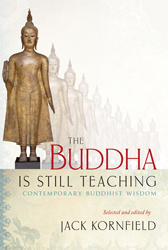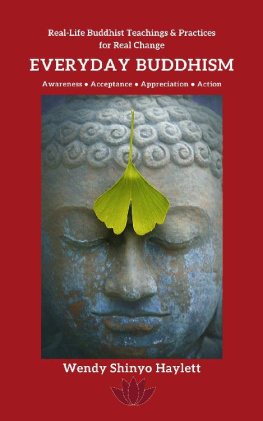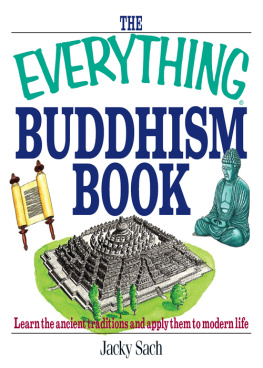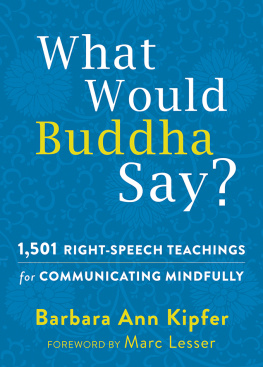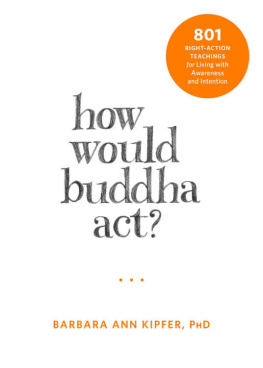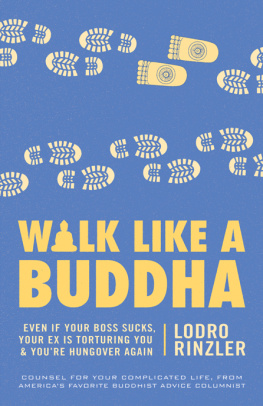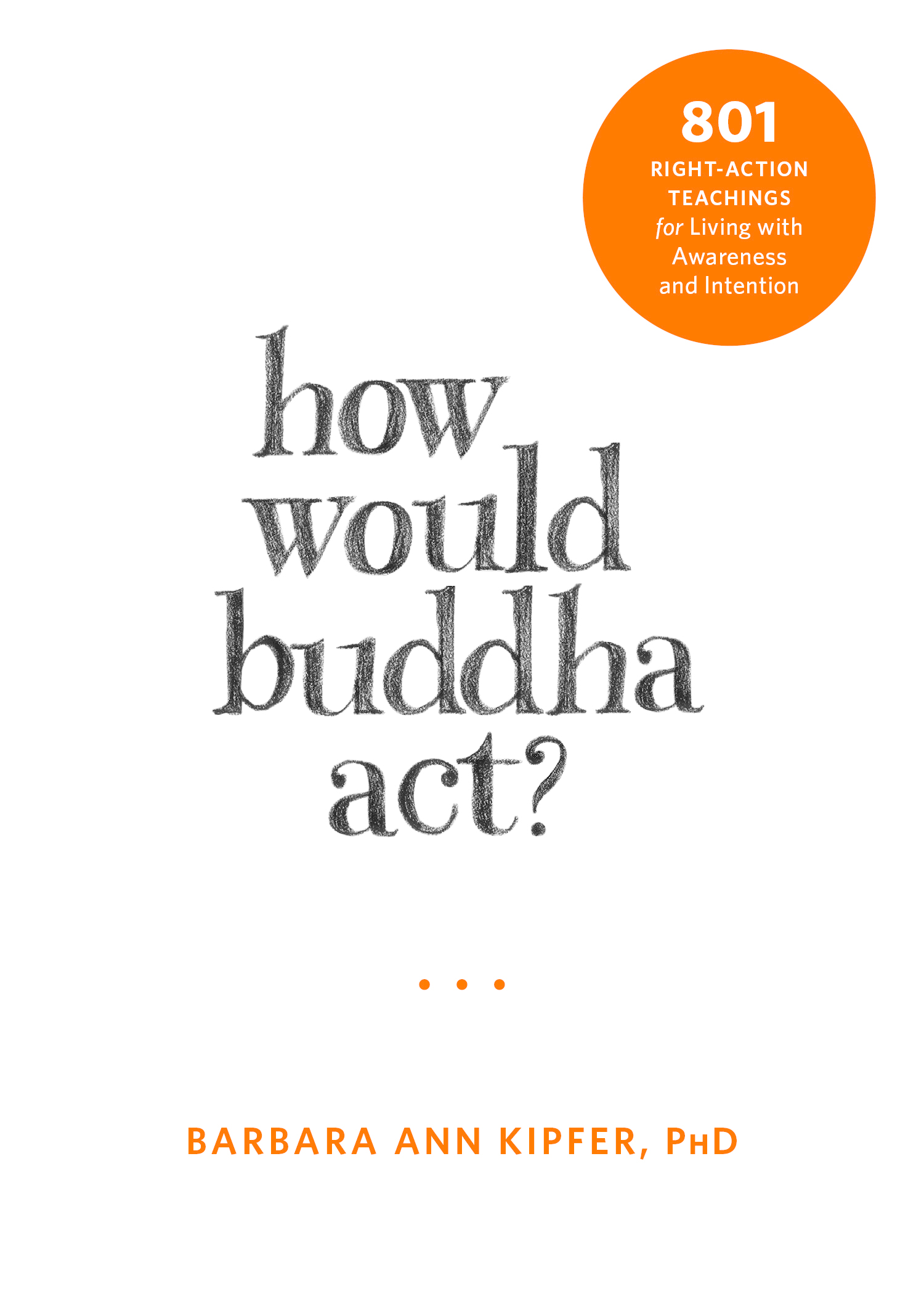
In her book How Would Buddha Act?, Barbara Kipfer, PhD, offers the reader many diverse and practical means to translate ancient wisdom teachings into positive action in todays world. Students of the Buddhas teachings will likely feel quite at home with the teachings, essays, and meditations in this book, and should enjoy the authors suggestions to bring those forward in the busyness of modern life. Readers not so familiar with Buddhist teachings will nonetheless benefit from reading and practicing any of these meditations, because, ultimately, these teachings and meditations, just like the teachings of the Buddha, are pointing us to always-present possibilities and direct methods for experiencing our lives with great wonder, and in ways that are at once deeply human and profoundly beautiful.
Jeff Brantley, MD, assistant consulting professor in the department of psychiatry and behavioral sciences at Duke University Medical Center; founding faculty member of Duke Integrative Medicine, and founder and director of its mindfulness-based stress reduction (MBSR) program; Distinguished Life Fellow of the American Psychiatric Association; author of Calming Your Angry Mind; and coauthor of Daily Meditations for Calming Your Angry Mind
Books on mindfulness are plentiful, yet those with an emphasis on ethics are in short supply. Mindfulness without an understanding of the deeper problems of greed and aversion can become self-serving. How Would Buddha Act? is a welcome exception. From its Dhammapada-like sayings to its practical guidance for dealing with strong emotions to its guided meditations, this book can be a helpful companion for living an ethical life.
Arnie Kozak, PhD, author of The Awakened Introvert and Mindfulness A to Z
In our stressful, overbooked lives, its all too easy to move through our days on autopilotoverdoing everything from eating and drinking to shopping, watching TV, and surfing the Internet. In this wise and engaging guide to the Buddhist concept of Right Action, Barbara Ann Kipfer offers a diverse array of teachings, meditations, and essays designed to help us act more skillfully and more lovingly to others andultimatelyto ourselves.
Carol Krucoff, E-RYT, yoga therapist at Duke Integrative Medicine, and author of several books, including Yoga Sparks and Healing Yoga for Neck and Shoulder Pain (www.healingmoves.com)
A fun book that is full of wisdom as well. Because it can be read in short sections, How Would Buddha Act? will be especially helpful for anyone who wants a lively way to take in reminders about mindfulness practice.
Sharon Salzberg, author of Lovingkindness and Real Happiness
Open to any page in How Would Buddha Act? and you will find inspiration and practical support you can apply throughout your day. Presented in a friendly, accessible style, Barbara Ann Kipfer offers skillful guidance for living in a way that creates more happiness and well-being for others and yourself.
Richard Shankman, author of The Art and Skill of Buddhist Meditation, and cofounder of Mindful Schools
We all feel frustrated when we notice our actions taking a wrong turn and leaving our beliefs behind, and when we judge those around us for acting as if theyve forgotten what really matters in life. Open How Would Buddha Act? to any page and find the right inspiration to nudge your actions back onto the path of your own wise heart.
Kimber Simpkins, author of Full and 52 Ways to Love Your Body
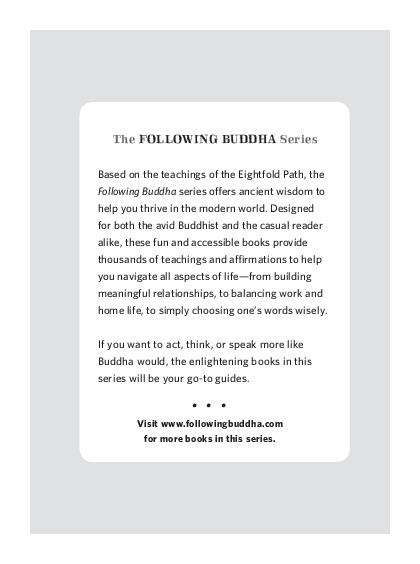
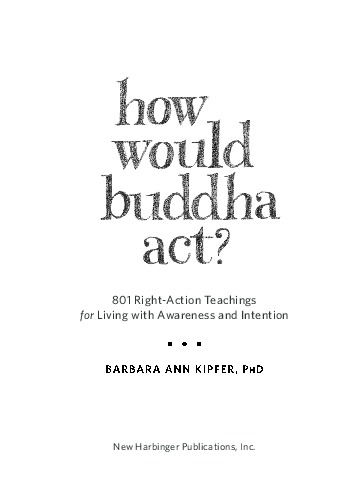
Contents
Publishers Note
This publication is designed to provide accurate and authoritative information in regard to the subject matter covered. It is sold with the understanding that the publisher is not engaged in rendering psychological, financial, legal, or other professional services. If expert assistance or counseling is needed, the services of a competent professional should be sought.
Distributed in Canada by Raincoast Books
Copyright 2016 by Barbara Ann Kipfer
New Harbinger Publications, Inc.
5674 Shattuck Avenue
Oakland, CA 94609
www.newharbinger.com
Cover design by Debbie Berne; Text design by Michele Waters-Kermes;
Acquired by Melissa Valentine; Edited by James Lainsbury
All Rights Reserved
Library of Congress Cataloging-in-Publication Data
Kipfer, Barbara Ann.
How would Buddha act? : 801 right-action teachings for living with awareness and intention6 / Barbara Ann Kipfer, PhD.
pages cm. -- (The new harbinger following Buddha series)
ISBN 978-1-62625-312-4 (pbk. : alk. paper) -- ISBN 978-1-62625-313-1 (pdf e-book) -- ISBN 978-1-62625-314-8 (epub) 1. Religious life--Buddhism. I. Title.
BQ5405.K57 2016
294.3444--dc23
2015028420
Thank you to New Harbinger for the opportunity to present this material. Great thanks to my editor and husband, Paul Magoulas, who inspires me to practice more Right Action in my life.
Thank you to everyone who supports my efforts to convey what I have learned, especially my sons Kyle Kipfer and Keir Magoulas.
Barbara Ann Kipfer
Think about how you get yourself in trouble by reacting instead of responding. The focus of How Would Buddha Act? is on training yourself to understand that you dont get away with anything; every thought, word, and deed has a consequence. A lot of what goes wrong in our lives is caused by not understanding the consequences of our actions.
Right Action is one of the elements in Buddhas Noble Eightfold Path to enlightenment. The paths elements are Right Speech, Right Action, Right View, Right Intention or Thought, Right Livelihood, Right Effort, Right Mindfulness, and Right Concentration.
What is Right Action? In simple terms, it is doing no harm. The Buddha specifically said that Right Action includes Five Precepts: abstaining from killing or harming living beings, refraining from taking what is not given freely, not committing sexual misconduct, not misusing intoxicants, and not using harmful speech. You can see that these words translate into doing no harm. If you act in loving, compassionate ways, responding with the intention of doing no harm and refraining from unskillful actions, you are taking a step on the Buddhas path.
We each do so much, living overbooked, stressful lives; balancing work and nonwork life; balancing the needs of our family with our own; and so on. We become frustrated, overwhelmed, and rushedand a manifestation of these perceived problems is seen in our actions. We have trouble with moderation when it comes to eating and drinking. We watch lots of television and Internet videos. We dont listen closely or pay attention, often doing things on autopilot. We are not in the present moment; instead we are mulling over the past or anticipating the future. We act with greed and appease our anger or suffering by consuming food and entertainment, among other things. We dont give to others or the community because we are so wrapped up in ourselves.
The wrongness of our actions is very evident when we do physical harm. But what if the wrongness is a more subtle matter: taking all the bread in the basket without regard for your dining companions, killing insects that get in your house, flirting with a neighbor, or drinking too much at a party? Did you hit the counter in a rage when your partner did not listen to your instructions? Did you speed to work because you overslept, endangering others on the road? These are actions that are clearly not right and do harm in some way, directly or indirectly. This book will discuss the positive and negative potentials our actions have.
Next page


